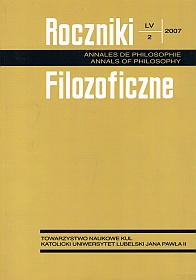Time Variable in Ancient and Medieval Concepts of the Conditional
Abstract
A problem of mutual relationships of the concepts of the conditional by Diodorus Cronus, Philo, Abelard, Pseudo Scotus (Iohannes do Cornubia?) and William of Ockham is examined. Both in ancient and medieval logic there seems to be a discussion on a version of the concept that involves a time variable and one that does not. Diodorus, Pseudo Scotus and Ockham, when defining the conditional, make essential use of temporal concepts, while Philo and Abelard do not. It is discussed, which concepts examined may be identified with one another and what is the rôle that the temporal concepts play.
References
Bocheński J. M.: Formale Logik, Frieburg–München: K. Alber 1956.
Grzegorczyk A.: Nieklasyczne rachunki zdań a metodologiczne schematy badania naukowego i definicje pojęć asertywnych, „Studia Logica” 20(1967), s. 117-131.
Kneale W., Kneale M., The Development of Logic, Oxford 1962.
Lechniak M.: Interpretacje wartości matryc logik wielowartościowych, Lublin: RW KUL 1999.
Łukasiewicz J.: Zur Geschichte der Aussagenlogik, ,,Erkenntnis” 5 (1935).
Mates B.: Stoic Logic, Berkeley: University of California Press 1961.
Copyright (c) 2007 Roczniki Filozoficzne

This work is licensed under a Creative Commons Attribution-NonCommercial-NoDerivatives 4.0 International License.





